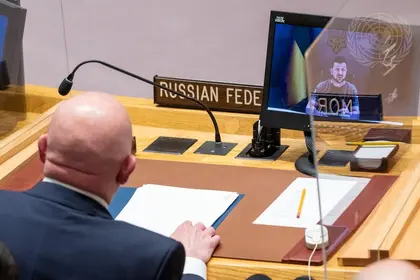For some legal experts, if the UN is to be a viable peacekeeping organization, then it must reboot the UN Security Council – without Russia.
For decades the UN has been criticized as being an overly bureaucratic behemoth, fast losing its ability to encourage or ensure international peace. The turning point, perhaps, came in 1995, when UN peacekeepers monitoring Srebrenica, a Bosnian city, stood by and watched as more than 8,000 Bosniak Muslim men were rounded up by Bosnian Serb troops and subsequently massacred.
JOIN US ON TELEGRAM
Follow our coverage of the war on the @Kyivpost_official.
Echoes of Srebrenica can now be heard throughout Ukraine, wherever Russian troops are. Unfortunately, the UN today seems even more powerless than it was in 1995. One of the major reasons why the organization meant to encourage world peace is so ineffectual stems from the fact that each of the five permanent members of the security council – the United States, the United Kingdom, France, China and Russia – can veto any resolution. As such, any one of the members can decide to paralyze a particular course of action.
Indeed, for decades the U.S. has been repeatedly criticized for vetoing any resolution unfavorable to its own interests or those of its allies, particularly Israel.
Today, Russia continues its aggression against Ukraine – any suggestion of UN peacekeepers or monitors overseeing elections elicits scorn because Russia would veto any resolution that might risk diminishing their advantage on the ground.

Trump’s 90-Day Foreign Aid Freeze Won’t Apply to Ukraine Military Funding, Pentagon Assures VOA
Both critics of the UN and champions of its raison d’être are painfully aware of the organization’s paralysis.
One suggestion has been to simply kick Russia off the security council. Of course, that’s easier said than done. Nevertheless, Thomas D. Grant, a Fellow of the Lauterpacht Centre for International Law at the University of Cambridge has put forth a blueprint on how to expel Russia from the UN Security Council – legally, and in line with the UN Charter and its amendments. Grant’s proposals were published on Sept. 26 by the Center for European Policy Analysis (CEPA).
Grant points to major shake-ups in the composition of the security council, such as communist China’s entry in 1971 (and, as a result, Taiwan’s exit) and South Africa’s ostracization due to its apartheid policy. He also lays out a procedural path that would enable Ukraine to substitute Russia as heir to the USSR.
While the chances of actually kicking the Russians off the security council remain quite low, the very attempt to do so could lead to a reform that might revitalize the organization, which many analysts deem to be ossified.
For details of Grant’s proposal see the CEPA article
You can also highlight the text and press Ctrl + Enter










